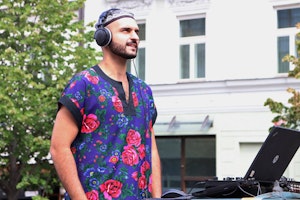Changing the Story about Minorities in Slovakia
By Jarmila Lajčáková
The debate around Roma in Slovakia is increasingly one of security. Prejudices—from varied strata of Slovak society—are allowed a publically acceptable face by presenting Roma as a threat to local even national security. Research from the Center for the Research of Ethnicity and Culture in Bratislava argues that this criminalization of Roma is a dangerous return to the past.
On September 29, 2012, the small, charming village Krásnohorské Podhradie in south east Slovakia, witnessed an unusual gathering. Hundreds of mostly burly men wearing army style outfits arrived to help the “white law abiding majority” against “the maladjusted and uncivilized” minority. The focal point of this demonstration was a piece of land recently acquired by a former high school teacher, Marián Kotleba. His supporters arrived that day to “clean” Kotleba’s property (though it is unclear which share is actually his as the land is co-owned) of an illegal Roma settlement, home to at least ten families or what Kotleba’s supporters viewed as “garbage.” Kotleba, who has also become leader of the extreme right-wing group People’s Party-Our Slovakia, while skillfully utilizing the attention of mass media, sought to demolish the Roma houses. Though eventually stopped, Kotleba’s point was made.
That very same day, thousands of mostly frustrated senior citizens protested in the town of Partizánske, Slovakia about the need to protect themselves from “societal parasites.” A group of mayors, openly exploiting ethnic hostilities and the economic uneasiness felt by many, organized a protest calling for the protection of “well-behaved people.” Several observers noted that the protests have been part of the mayors’ campaign in the upcoming elections.
A couple of weeks later, another political entrepreneur, Oskar Dobrovodský organized a rally in Bratislava, Slovakia’s capital. Thanks to biased media coverage of Dobrovodský’s personal dispute with a neighboring Roma family, he has become the symbol and ultimate proof of Slovaks’ suffering caused by the “maladjusted” minority. On October 13, 2012, coinciding with the birthday of Jozef Tiso—infamous ex-head of the Slovak state while a satellite of Nazi Germany—supporters walked the streets of Bratislava carrying flags reminiscent of this era. A group of university professors along with human rights activists, who formed a symbolic human chain to stop the protest, were pushed aside by the police so that the protesting extremists could freely exercise their political rights.
Mainstream politicians have not lagged behind in their proposals on how to protect the majority from the threat of Roma. In January 2011, the then Interior Minister Daniel Lipšic and his advisor on Roma criminality introduced so called criminality maps—maps of areas with increased criminality. Lipšic presented his plan of combating this de facto officially recognized type of criminality in front of dozens of police in one of the poorest Roma communities in Jarovnice. The former state secretary and current Member of Parliament (MP), Lucia Nicholsonová, has positioned herself as a hero that protects Slovaks against the Roma, comparing them to a ticking bomb. She has repeatedly put forward plans on how to “de-demonize” free sterilizations, indirectly intended for poor Roma women. In June 2012, two more opposition MPs Pavol Frešo and Ľudovít Kaník promoted their new legislative proposals on how to speed up the legal processes allowing demolitions of illegally built houses. It was no coincidence that their press conference was held in front of a Roma settlement in Plavecký Štvrtok, an extremely poor community in Slovakia’s wealthiest region.
Over time, all these acts have contributed to the redefinition of Roma exclusion and poverty as a security matter. This development has been sadly legitimized by the recently appointed Government Plenipotentiary for Roma communities, Peter Pollák, who himself is of Roma origin. Hoping to appeal to the ethnic majority, Pollák became perhaps the most vocal advocate on the need to restrict social welfare and ensure that no Roma goes unpunished for their offences and transgressions (such as stealing potatoes). According to Pollák’s newly introduced pillars of the “Roma reform”, the state should monitor and evaluate citizens’ “approach” to the state. In a section devoted to education, children of families that are poor and have a higher “propensity to criminality” should compulsorily attend kindergarten from the age of three.
Pollák’s reform is one of the worrying examples of senior state officials abusing security dynamics for political gain. Proposals on how they will protect the majority are aimed at winning the support of the electorate regardless of any negative consequences. This populist dynamic prevents any meaningful discussion about positive measures to address extreme inequalities experienced by the Roma minority. Instead, it facilitates the smooth adoption of repressive measures against some of Slovakia’s most vulnerable, including welfare cuts.
Although current debates in Slovakia heavily securitize the Roma minority, a similar approach is periodically applied to other groups, most often ethnic Hungarians and immigrants. Hungarians are by definition viewed as disloyal and permanently accused of collaboration with Hungary. Based on unfounded assumptions, some groups of immigrants are closely linked with terrorism while others are suspected of ambitions to threaten the economic interests of the Slovaks. As a result, Slovakia’s citizenship law, for instance, underwent dramatic restrictions both in terms of conditions for naturalization and allowing for multiple citizenships.
The Center for the Research of Ethnicity and Culture offers an alternative story about the place of national, ethnic and religious minorities within larger Slovak society. Drawing on the famous thesis of the Canadian philosopher Will Kymlicka warning against the securitization of minorities and minority rights in Central and Eastern Europe, we caution against this same securitization in Slovakia. While bringing together academic research with NGO activism, we offer an alternative story based on the principles of human dignity. Our interpretation of these principles does not only derive from international human rights law but importantly also from Slovak constitutional law. We argue that Slovakia should no longer be constructed as a state owned by ethnic Slovaks, but as a multicultural country of all its citizens and permanent members to ensure the inclusion of minorities. The transformation would mean that minorities are no longer viewed as a danger to the majority and consequently to peace and stability but instead are seen as equally valuable and respected members of society. Their claims should be judged by the criteria of equality, not as a matter of security or the economic interests of the majority.
The project Monitoring Minority Policies in Slovakia, supported by the Open Society Foundations Think Tank Fund, provides the central pillar for our activities. One stream focuses on sustained monitoring of minority policies, going beyond scrutiny of international minority rights standards. We point out the risks of securitization when evaluating policies and offer alternative proposals based on the principles of human dignity and equality. Secondly, along with advocacy for more conventional affirmative action policies we argue for more innovative models of power sharing that would help minorities become active decision-makers in matters that concern them. This changes minorities from objects of policy making at the mercy of ethnic Slovaks to active agents of change. We work with all those who have the power and commitment to change the public discourse, among them, politicians, NGO activists and experts, minority organizations and academics. Among our successes so far is introducing the first inclusion plan for migrants in the town of Martin in Slovakia.
How can a small independent research institute with limited resources change the dominant narrative? Moreover, how is it possible to stem the securitization debate as it intensifies amidst economic recession? Paradoxically, that is precisely why we feel that the momentum for providing an alternative perspective is building. Surprisingly, our story is more intensively sought by many other NGO actors, journalists, and politicians that somehow feel, but cannot themselves identify why, things are taking the wrong direction in Slovakia far too quickly.
Read the Center for the Research of Ethnicity and Culture's report on minority policy in Slovakia here.
Jarmila Lajčáková is a lecturer at Center for the Research of Ethnicity and Culture in Bratislava, Slovakia


